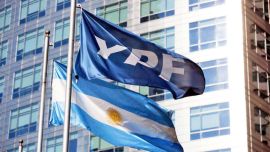Leopoldo Luque, Diego Maradona's personal physician, on Monday denied any responsibility for the late footballer's death, in which he and six other medical personnel are being investigated for manslaughter.
Neurosurgeon Leopoldo Luque, 39, appeared before prosecutors in San Isidro, Buenos Aires Province, to answer to claims that he and other caregivers had neglected Maradona in his final days, precipitating his death. Through his lawyer, he denied any wrongdoing.
Luque will "explain that he was not in charge of [Maradona's] home care" as he recovered from brain surgery for a blood clot, the doctor's lawyer, Julio Rivas, said on the sidelines of the hearing.
Maradona, 60, was found dead in bed last November, two weeks after the surgery, in a rented house in Tigre, where had been living since being discharged from hospital. He was found to have died of a heart attack.
"I see no responsibility either in Agustina or in Leo" for Maradona's death, Rivas said of Luque and fellow co-accused, psychiatrist Agustina Cosachov, 36.
Other members of the team have said the duo were in charge of the retired footballer's care.
Luque's questioning closes a two-week process of interrogation. He and the other six have appeared one by one to defend themselves against the accusations.
'Agonising' end
A judge will next decide whether to order a trial, in a process that could take years. The suspects risk between eight and 25 years in jail if found guilty.
An investigation was opened following a complaint filed by two of Maradona's five children against Luque, whom they blame for their father's deterioration after the operation.
A panel of 20 medical experts convened by Argentina's public prosecutor said last month that Maradona's treatment was rife with "deficiencies and irregularities."
The panel concluded he "would have had a better chance of survival" with adequate treatment in an appropriate medical facility.
The board found the team had provided inadequate care and abandoned the idolised player to his fate for a "prolonged, agonizing period."
Luque, who has described the sporting legend as a friend, arrived at the prosecutor's office in San Isidro in a dark suit and tie and dark glasses an hour before his hearing was due to start Monday. He made no statement to waiting journalists.
Judicial sources told AFP his lawyers had submitted a document to prosecutors ahead of the hearing that is expected to last several hours.
He is not obliged to answer questions, but Rivas said Monday that he will.
'I did my best'
Luque has repeatedly denied guilt and recently said, "I'm proud of what I did" to assist the patient, denying allegations he had abandoned him.
"I did my best. I offered Diego everything I could: some things he accepted, others not," he said in a recent interview.
The doctor said Maradona had been depressed in his final days.
"I know that the [coronavirus] quarantine hit him very hard," Luque has said.
Maradona appeared in public on October 30 last year at an event to mark his 60th birthday, visibly weakened and appearing to be having difficulty speaking and walking.
Duque ordered him hospitalised, which is when the blood clot was discovered.
Discharged from hospital after surgery, Maradona was confined to home care, but some of his medical team have told prosecutors the house lacked medical equipment.
Last week, a lawyer for co-accused nurse Dahiana Madrid, 36, said the medical team leaders had "killed Diego."
"In the end, there were many warning signs that Maradona was going to die, give or take a day. And none of the doctors did anything to prevent it," attorney Rodolfo Baque said at the time.
The other four people under suspicion are nurse Ricardo Almirón, 37; nursing coordinator Mariano Perroni, 40; medical coordinator Nancy Forlini, 52; and psychologist Carlos Díaz, 29. All have denied responsibility.
Local reports on Monday said that lawyer Mario Baudry, who is representing Maradona's youngest son, Dieguito Fernando, had requested that Lque, Cosachov, Díaz and Forlini be placed under pre-trial arrest.
Maradona had battled cocaine and alcohol addictions for years. The former Boca Juniors, Barcelona and Napoli star suffered from liver, kidney and cardiovascular disorders when he died.
– TIMES/AFP





















Comments